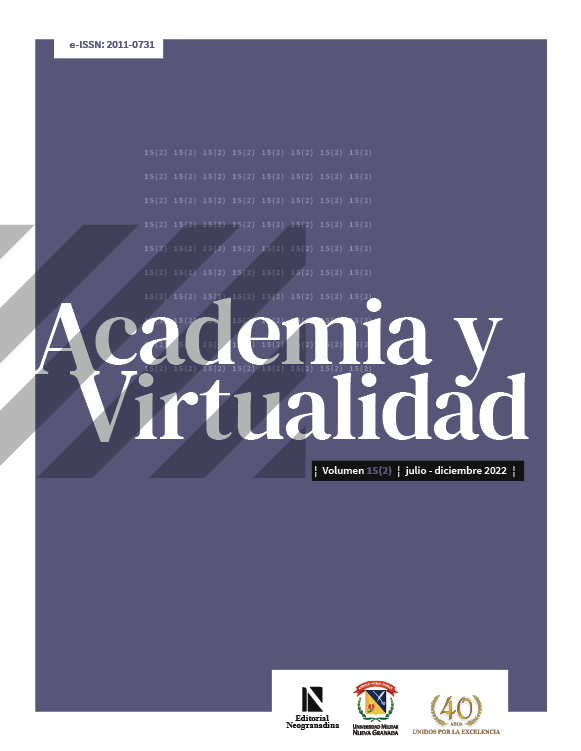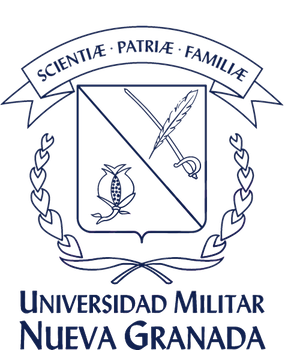Perception of use of "Finatic: una ciudad sostenible", a gamified tool for high school students in Santander, Colombia
Abstract
The purpose of this article is to present the results of a study that allowed identification of the perceptions of a group of eleventh-grade students on the use of the gamified tool or video game "Finatic: una ciudad sostenible", which seeks to support the economic and financial education of young people from educational institutions in Santander, Colombia. For this, a qualitative analysis methodology was used, which includes a descriptive analysis and a text-mining analysis of the information collected from a measurement instrument and includes factors such as narratives, levels, and missions, referring to elements of the game design. The study shows that there is acceptance among the students for the narratives and mechanics proposed in the tool. In addition, as the main finding, it was found that the initial version of the video game is accepted by the students, and, as in any process, it is necessary to make adjustments for its improvement and greater acceptance by users. The foregoing is essential since technological changes and the current rapid economic growth have generated the need to promote the design and implementation of tools that encourage the development of sustainable lifestyles in terms of personal finances in young people.
Downloads
References
Acosta-Medina, J. K., Torres-Barreto, M. L., Álvarez-Melgarejo, M. y Paba-Medina, M. C. (2020). Gamificación en el ámbito educativo: un análisis bibliométrico. I+D Revista de Investigaciones, 15(1), 28-36. DOI: https://doi.org/10.33304/revinv.v15n1-2020003
Asobancaria. (2018). ¿Por qué debemos implementar el programa de Educación Financiera en los colegios de Colombia? [Diapositivas de Power Point]. Semana económica 2018. https://www.asobancaria.com/wp-content/uploads/1167.pdf.
Bauman, Z. (2012). Liquid Modernity. (2012th ed.). Polity Press.
Briceño, M. T. (2009). El uso del error en los ambientes de aprendizaje: una visión transdisciplinaria. Revista de Teoría y Didáctica de las Ciencias Sociales, (14), 9-28.
Callaghan, N. (2016). Investigating the role of Minecraft in educational learning environments. Educational Media International, 53(4), 244-260. DOI: https://doi.org/10.1080/09523987.2016.1254877
Chen, V., Duh, H., Phuah, P. y Lam, D. (2006). Enjoyment or engagement? Role of social interaction in playing massively mulitplayer online role-playing games (MMORPGS). International Conference on Entertainment Computing, 262-267. DOI: https://doi.org/10.1007/11872320_31
De Soto García, I. S. (2018). Herramientas de gamificación para el aprendizaje de ciencias de la tierra. Edutec. Revista Electrónica de Tecnología Educativa (65), 29-39. DOI: https://doi.org/10.21556/edutec.2018.65.1143
Departamento Nacional de Planeación (DNP). (2019). Bases del Plan Nacional de Desarrollo 2018-2022. DNP.
Deterding, S., Dixon, D., Khaled, R. y Nacke, L. (2011). From game design elements to gamefulness: defining "gamification". Proceedings of the 15th International Academic MindTrek Conference: Envisioning Future Media Environments, 9-15. DOI: https://doi.org/10.1145/2181037.2181040
Dicheva, D., Dichev, C., Agre, G. y Angelova, G. (2015). Gamification in education: A systematic mapping study. Journal of Educational Technology & Society, 18(3).
Duque, E., González, J. D. y Ramírez, J. (2016). Conocimientos financieros en jóvenes universitarios: caracterización en la Institución Universitaria Esumer. Revista de Pedagogía, 37(101), 41-55.
Erneling, C. E. (2010). Towards discursive education: Philosophy, technology, and modern education. Cambridge University Press. DOI: https://doi.org/10.1017/CBO9780511761799
Gálvez, C. (2008). Minería de textos: la nueva generación de análisis de literatura científica en biología molecular y genómica. Encontros Bibli: revista eletrônica de biblioteconomia e ciência da informação, 13(25), 1-14. DOI: https://doi.org/10.5007/1518-2924.2008v13n25p1
García, N., Grifoni, A., López, J. y Mejía, D. (2013). La educación financiera en América Latina y el Caribe. Situación actual y perspectivas. Banco de Desarrollo de América Latina, CAF (Vol. 12).
Hsu, C. y Lu, H. P. (2004). Why do people play on-line games? An extended TAM with social influences and flow experience. Information & Management, 41(7), 853- 868. DOI: https://doi.org/10.1016/j.im.2003.08.014
Hunicke, R., LeBlanc, M. y Zubek, R. (2004). MDA: A formal approach to game design and game research. Proceedings of the AAAI Workshop on Challenges in Game AI, 4(1), 1722.
Kapp, K. M. (2012). The gamification of learning and instruction: game-based methods and strategies for training and education. John Wiley & Sons. DOI: https://doi.org/10.1145/2207270.2211316
Liu, C. L., Chang, D. F. y Chuang, C. M. (2019). Investigation of the financial literacy among high school students. ICIC Express Letters, Part B, 10(5), 387-393.
Ministerio de Educación Nacional. (2014). Mi vida, mi plan, mi futuro. Orientaciones pedagógicas para la educación económica y financiera. MEN.
Moreno-Correa, S. M. (2020). La innovación educativa en los tiempos del Coronavirus. Salutem Scientia Spiritus, 6(1), 14-26.
Observatorio de Innovación Educativa - Tecnológico de Monterrey. (2016). Edu Trends - Gamificación.
OECD (2020). PISA 2018 Results (Volume IV): Are Students Smart about Money? PISA, OECD Publishing, París.
OECD. (2005). Improving financial literacy: Analysis of issues and policies. CFA Institute Magazine, 25(2).
Ritterfeld, U., Cody, M. y Vorderer, P. (Eds.). (2009). Serious games: Mechanisms and effects. Routledge. DOI: https://doi.org/10.4324/9780203891650
Robson, K., Plangger, K., Kietzmann, J. H., McCarthy, I. y Pitt, L. (2015). Is it all a game? Understanding the principles of gamification. Business Horizons, 58(4), 411- 420. DOI: https://doi.org/10.1016/j.bushor.2015.03.006
Sellan Naula, M. E. (2017). Importancia de la motivación en el aprendizaje. Sinergias Educativas, 2(1), 13-19. DOI: https://doi.org/10.31876/s.e.v2i1.20
Simões, J., Edondo, R. D. y Vilas, A. F. (2013). A social gamification framework for a K-6 learning platform. Computers in Human Behavior, 29(2), 345-353. DOI: https://doi.org/10.1016/j.chb.2012.06.007
Supanantaroek, S., Lensink, R. y Hansen, N. (2017). The Impact of Social and Financial Education on Savings Attitudes and Behavior Among Primary School Children in Uganda. Evaluation Review, 41(6), 511-541. DOI: https://doi.org/10.1177/0193841X16665719
Torres-Barreto, M. L. (2018). Herramienta didáctica motivacional basada en gamificación y apoyada en TIC para adquirir y aplicar competencias transversales en estudiantes de ingeniería: Motivatic. Universidad Industrial de Santander. Working paper, Bucaramanga, Colombia.
Vázquez-Alonso, Á. y Manassero-Mas, M. A. (2017). Juegos para enseñar la naturaleza del conocimiento científico y tecnológico. Educar, 53(1), 149-170. DOI: https://doi.org/10.5565/rev/educar.839
Werbach, K. y Hunter, D. (2012). For the win: How game thinking can revolutionize your business. Wharton Digital Press.
Zichermann, G. y Cunningham, C. (2011). Gamification by design: Implementing game mechanics in web and mobile apps. O'Reilly Media, Inc.

Copyright (c) 2022 Academia y Virtualidad

This work is licensed under a Creative Commons Attribution-NonCommercial-NoDerivatives 4.0 International License.











